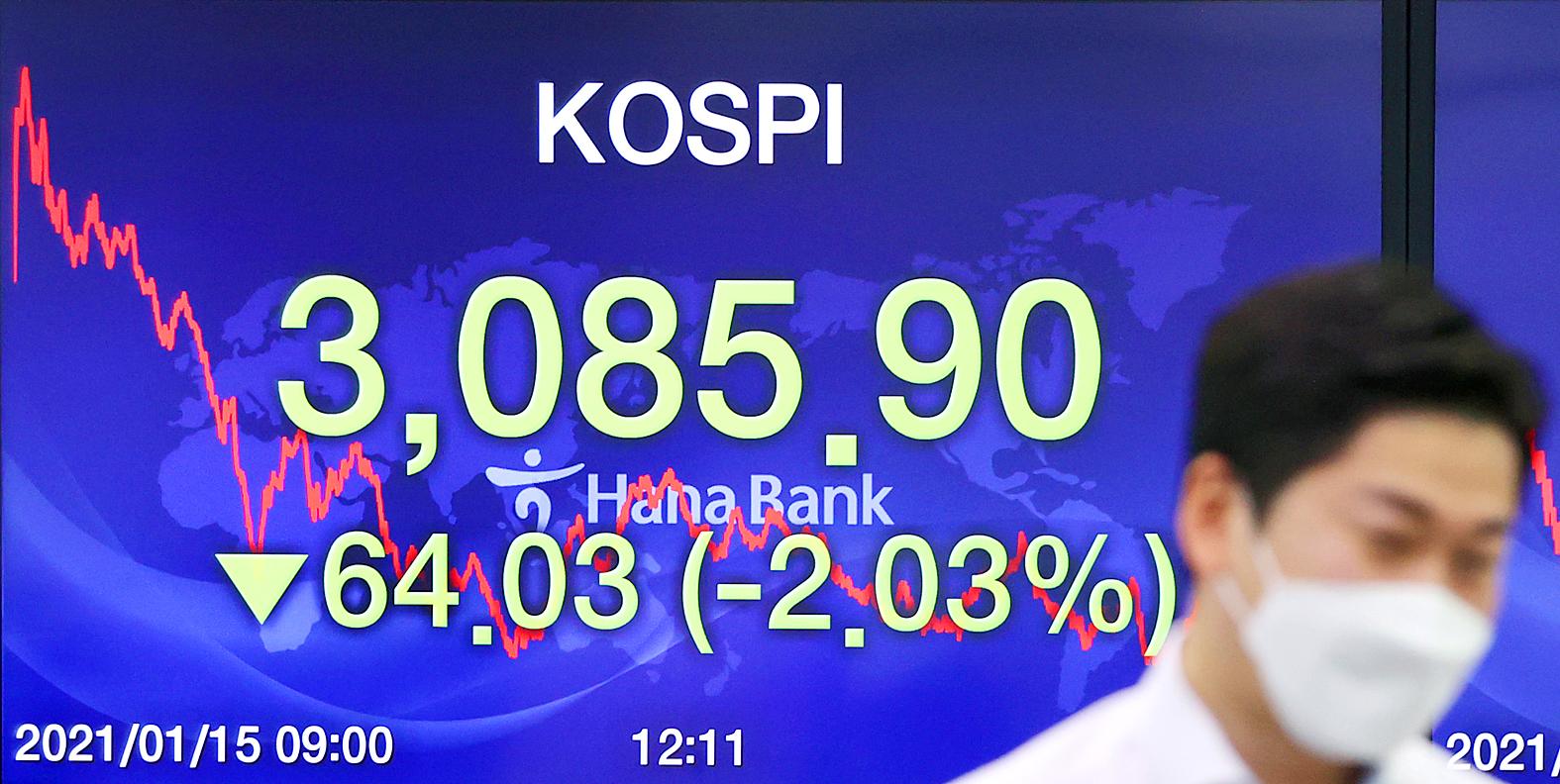US president-elect Joe Biden’s US$1.9 trillion stimulus proposal was met with a shrug in Asia on Friday as observers said that the massive spending spree had been largely factored into valuations, while profit-taking weighed on markets at the end of a broadly healthy week.
Reassurances from US Federal Reserve Chairman Jerome Powell that record-low interest rates and loose monetary policy would remain in place for some time removed some lingering angst on trading floors, while there remains plenty of optimism about the long-term economic outlook.
Surging virus infections and deaths — and the lockdowns they are forcing governments to impose — are the main stumbling blocks for investors, despite the rollout of vaccines that could allow life to return to normal.

Photo: EPA-EFE
With days before he takes office, Biden unveiled his rescue package, which he said addressed “the twin crises of a pandemic and this sinking economy.”
The plans include an extra US$1,400 in cash for individuals — to top up the US$600 in last month’s stimulus — a hike in the minimum wage to US$15 an hour and billions of US dollars to ramp up vaccinations so that 100 million are administered in 100 days.
However, analysts said that while Democrats have control of the US Congress, the spending plans are far from guaranteed to get through untouched.
While welcomed by investors, the proposals failed to fire a surge in stocks, with Asian markets mostly down.
In Taipei, the TAIEX on Friday fell below 16,000 points on high turnover, ending down 90.80 points, or 0.58 percent, at 15,616.39 on expanded turnover of NT$433.156 billion (US$15.2 billion).
Boosted by a 6 percent rise overnight by the American depositary receipts of Taiwan Semiconductor Manufacturing Co (台積電), the weighted index soared 334 points at one point, reaching a record high of 16,041.59 and fluctuating in a wide range of 426.48 points.
The TAIEX eventually closed below the five-day moving average of about 15,636, but still rose 0.99 percent for the week.
In Tokyo, the TOPIX lost 0.89 percent to close at 1,856.61, but eked out a 0.09 percent gain for the week.
South Korea’s KOSPI declined 2.03 percent to 3,085.90, dropping 2.1 percent from a week earlier, while India’s SENSEX lost 1.11 percent to 49,034.67, but increased 0.52 percent on the week.
Australia’s S&P/ASX 200 held virtually steady, rising 0.1 points to 6,715.4, and declining 0.63 percent from a week earlier.
The Shanghai Composite Index was up a slight 0.01 percent at 3,566.38, but dropped 0.1 percent from a week earlier.
Bucking the general trend, Hong Kong’s Hang Seng Index rose 0.27 percent to end at 28,573.86, its highest closing level since Jan. 17 last year. It rose 2.5 percent from a week earlier.
“Seems like this was already priced in, at least as far as magnitude,” DailyFX head strategist Ilya Spivak said. “The main question is how much of it gets compromised away to get it passed. That is probably the next layer of speculative uncertainty that markets are focused on. Hence the muted response.”

Among the rows of vibrators, rubber torsos and leather harnesses at a Chinese sex toys exhibition in Shanghai this weekend, the beginnings of an artificial intelligence (AI)-driven shift in the industry quietly pulsed. China manufactures about 70 percent of the world’s sex toys, most of it the “hardware” on display at the fair — whether that be technicolor tentacled dildos or hyper-realistic personalized silicone dolls. Yet smart toys have been rising in popularity for some time. Many major European and US brands already offer tech-enhanced products that can enable long-distance love, monitor well-being and even bring people one step closer to

Malaysia’s leader yesterday announced plans to build a massive semiconductor design park, aiming to boost the Southeast Asian nation’s role in the global chip industry. A prominent player in the semiconductor industry for decades, Malaysia accounts for an estimated 13 percent of global back-end manufacturing, according to German tech giant Bosch. Now it wants to go beyond production and emerge as a chip design powerhouse too, Malaysian Prime Minister Anwar Ibrahim said. “I am pleased to announce the largest IC (integrated circuit) Design Park in Southeast Asia, that will house world-class anchor tenants and collaborate with global companies such as Arm [Holdings PLC],”

TRANSFORMATION: Taiwan is now home to the largest Google hardware research and development center outside of the US, thanks to the nation’s economic policies President Tsai Ing-wen (蔡英文) yesterday attended an event marking the opening of Google’s second hardware research and development (R&D) office in Taiwan, which was held at New Taipei City’s Banciao District (板橋). This signals Taiwan’s transformation into the world’s largest Google hardware research and development center outside of the US, validating the nation’s economic policy in the past eight years, she said. The “five plus two” innovative industries policy, “six core strategic industries” initiative and infrastructure projects have grown the national industry and established resilient supply chains that withstood the COVID-19 pandemic, Tsai said. Taiwan has improved investment conditions of the domestic economy

Sales in the retail, and food and beverage sectors last month continued to rise, increasing 0.7 percent and 13.6 percent respectively from a year earlier, setting record highs for the month of March, the Ministry of Economic Affairs said yesterday. Sales in the wholesale sector also grew last month by 4.6 annually, mainly due to the business opportunities for emerging applications related to artificial intelligence (AI) and high-performance computing technologies, the ministry said in a report. The ministry forecast that retail, and food and beverage sales this month would retain their growth momentum as the former would benefit from Tomb Sweeping Day